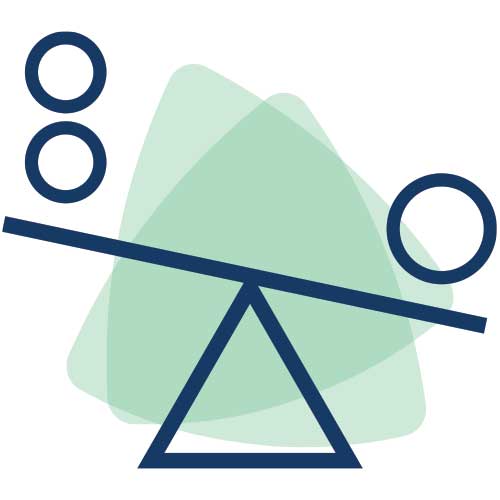Dyspraxia
Dyspraxia can affect your movement, coordination, and other areas of your work study and everyday life. Getting a diagnosis or support through a needs assessment can help you find the recipe for learning and working your way. Below are some common questions on dyspraxia.
Diagnostic assessments
Our diagnostic assessments can tell you if you have a specific learning difficulty (SpLD) with traits of dyspraxia.
We offer remote video assessments or in-person appointments in Yorkshire.
Needs assessments
If you are dyspraxic or believe you have dyspraxia, our one-to-one online needs assessments aim to understand how you currently learn and work, then create personalised strategies and recommend assistive technologies that will help you excel.
What is Dyspraxia ?
Dyspraxia is a neurological condition that affects a person’s ability to plan and carry out certain tasks because of the way their brain processes and coordinates motor and sensory activity. It is best known for its negative impact on a person’s motor (movement) skills.
You may also hear dyspraxia referred to as developmental coordination disorder (DCD), but we recognise that many people now prefer to avoid using the word ‘disorder’. There is still some debate among experts about the terms we use and what they refer to, but dyspraxia is a term more commonly understood and used by the general population in the UK, and DCD is a term more commonly used internationally and by researchers and healthcare professionals. We will use the phrase ‘dyspraxia/DCD’ throughout this article: this follows the approach of the Dyspraxia Foundation.


Although motor difficulties are the main symptoms that define dyspraxia/DCD, it can affect multiple areas of a dyspraxic person’s life, including:
- Speech and language
- Reading and writing
- Playing sports
- Tasks requiring balance
- Learning to drive or ride a bike
- Planning and organisation
When healthcare professionals are evaluating someone who has difficulty in these areas, they also look carefully at whether there might be another cause. Other conditions that can share symptoms with dyspraxia/DCD include cerebral palsy and stroke. These conditions require very specific treatment, so it is important to see your GP first if you notice that you or your child has trouble with these activities.
Every dyspraxic person is different, so they may not experience difficulties in all of these areas, or all of the time. Many dyspraxic people develop their own coping strategies, which can mask these difficulties at work, in their learning or in their social lives. Being dyspraxic does not impact your overall intelligence, but it can affect some cognitive skills like working memory and attention. The areas of life that dyspraxia can impact may not be obvious, but they can include:
- Difficulty organising yourself, like planning work or studying and managing your time.
- Trouble keeping up with conversations, which might result in long pauses as you try to process how to respond to a question or comment.
- Challenges learning or transferring skills that involve new patterns of coordinated movement.
- Extra physical and mental effort to carry out movement that others manage easily, which can lead to fatigue and lower self-esteem.
- Poor spatial awareness which can lead to more trips, bumps and bruises.
- Ongoing difficulty making the precise movements needed to speak clearly – this is referred to as verbal dyspraxia, which can form part of a person’s dyspraxia/DCD or can be a diagnosis on its own.
We don’t have as much research about dyspraxia as we do about dyslexia, but some studies have indicated that autistic people are more likely to be dyspraxic, and that other neurodevelopmental conditions like ADHD and dyslexia are also more common for dyspraxic people.
Looking for information about dyspraxia diagnosis
How is dyspraxia assessed?
In the UK, medical diagnosis of dyspraxia/DCD can only be made by a qualified doctor, usually a paediatrician during childhood. Their diagnosis is supported by assessments made by other specialists such as physiotherapists, occupational therapists and educational psychologists. This process will follow a referral from a GP, health visitor or special educational needs coordinator (SENCO).

You should always speak to your GP first if you or your child are experiencing motor (movement) coordination difficulties. Educational psychologists and specialist assessors are also able to assess for a specific learning difficulty (SpLD) with traits of dyspraxia in people aged 16 or over. At Aim Forward, our team includes educational psychologists registered with the HCPC and specialist assessors with an Assessment Practising Certificate, who can provide diagnostic assessments for specific learning difficulty (SpLD) with traits of dyspraxia.
During a diagnostic assessment with Aim Forward, you will be asked to complete several tasks. These are not pass or fail tests – they are designed to highlight indicators of an SpLD as well as your strengths and weaknesses. The following areas will be explored:
- Language and practical tasks
- Memory
- How long it takes you to process information
- Reading ability
- Writing and spelling skills
The diagnostic assessment also involves a background information questionnaire, which you complete before the diagnostic assessment. This provides the assessor with information about your educational background, medical history and any previous assessments.
How can I get tested for dyspraxia?
Paediatricians diagnose dyspraxia/DCD in children, usually in collaboration with other healthcare specialists like physiotherapists and occupational therapists.
You can also be assessed for a specific learning difficulty (SpLD) with traits of dyspraxia with Aim Forward if you are aged 16 or over, even if you are an adult. All you have to do is book a diagnostic assessment with us. You do not need to meet specific requirements or show us evidence before you book, but you should speak to your GP if they don’t know that you or your child are experiencing motor coordination difficulties.
After booking your assessment, we will send you a background questionnaire to complete: this helps give our assessors a big picture of key aspects of your life which might relate to your neurodivergence, including medical history, experiences in working and learning and anything you know you have difficulties with.
Based on your background questionnaire, our assessors may send additional questionnaires to fill in more detail about specific areas, especially if they think you may have more than one SpLD.
What are the benefits of a dyspraxia assessment?
Identifying yourself as being neurodivergent does not require a diagnosis and is supported by many in the neurodivergent community. Having said this, some people feel that they would benefit from having specific terms for their experiences and access to specific treatment options. A diagnosis can also make it easier to discuss reasonable adjustments at work or personal learning plans at school or university. This is because a diagnosis of a specific learning difficulty (SpLD) with traits of dyspraxia is recognised as a disability under the Equality Act 2010. It can also give you access to government support schemes such as Access to Work and Disabled Students’ Allowance.
What happens during a dyspraxia assessment?
During a diagnostic assessment for dyspraxia, the assessor will talk with you about your background, but they will also ask you to complete tasks to assess your strengths and weaknesses in different areas such as:
- Language and practical tasks
- Memory
- How long it takes you to process information
- Reading ability
- Writing and spelling skills
These tasks are not pass or fail – they are designed to highlight indicators of dyspraxia, your cognitive profile, as well as your strengths and weaknesses.
While you may have contacted us about signs of dyspraxia, the tasks your assessor asks you to complete may also check for signs of other specific learning difficulties (SpLDs), like dyslexia or ADHD, if any of the traits have been identified from your background information. This is because it is common for people to display characteristics of more than one SpLD.
At Aim Forward, all our diagnostic assessments are performed by either educational psychologists who are registered with HCPC or specialist assessors with an Assessment Practising Certificate.
How long does a dyspraxia assessment take?
A diagnostic assessment for specific learning difficulty (SpLD) with traits of dyspraxia can take up to 3 hours, but we offer breaks as often as you need them. Our assessors will ask you to complete multiple tasks to test your strengths and weaknesses during the assessment, as well as talking with you, which is why it can take some time.
What’s the difference between a screener, a medical diagnosis of DCD/dyspraxia and dyspraxia assessments?
A screener is a checklist or questionnaire that you complete yourself, usually online. It is designed to indicate whether personal difficulties or traits may be the result of a condition like dyspraxia/DCD. The results do not form a diagnosis, they are only indicative. There are many different types of screening tests, and they can be a useful place to start when you are in the early stages of exploring your neurodivergence, but they cannot give you a diagnosis. They also only offer limited insight into your experiences, and they are not always considered accurate.
Medical assessments for dyspraxia/DCD are done through the NHS (or private clinics), after a referral from a GP, health visitor or special educational needs co-ordinator (SENCO). These assessments involve physical tests with occupational therapists and physiotherapists to test your motor skills (the way your muscles move and coordinate). You should always speak to your GP first about any motor coordination difficulties that you or your child experience.
If you are an adult or young person age 16 or over, a diagnostic assessment for a specific learning difficulty (SpLD) with traits of dyspraxia can be provided by a qualified assessor with Aim Forward. They will be an educational psychologist registered with the HCPC or a specialist teacher with an Assessment Practising Certificate. A diagnosis of a SpLD with traits of dyspraxia can provide you with more insight about dyspraxia, your cognitive profile, and how your traits impact the way you learn and work in everyday life. It may also identify traits of other SpLDs such as dyslexia or ADHD if they are present in your cognitive profile as well.
At Aim Forward we provide diagnostic assessments, please click here to book now.
How much does a diagnostic assessment for dyspraxia cost?
A diagnostic assessment for specific learning difficulty (SpLD) with traits of dyspraxia costs £820 (inc VAT).
What happens after a dyspraxia test?
Around 10 working days after a diagnostic assessment for a specific learning difficulty (SpLD) with traits of dyspraxia with Aim Forward, you will receive a personalised report which contains:
- Summary of the report
- Diagnostic decision
- Your cognitive profile
- Your strengths and weaknesses
- Recommended sources of additional information or support
If you have any questions after you receive and read through your report, our Support team is always on hand to help.
Can I get dyspraxia testing as an adult?
Yes! If you are an adult who thinks they might be dyspraxic, you can book a diagnostic assessment for a specific learning difficulty (SpLD) with traits of dyspraxia or a needs assessment with Aim Forward.
Our understanding of dyspraxia/DCD and neurodivergence in general has transformed in the last 5-10 years. We know that some people may have had their dyspraxia/DCD missed when they were at school or university because our understanding in the past wasn’t the same as it is now. Many dyspraxic people also developed successful coping strategies, which helped to mask these difficulties in their learning, at work or in their social lives.
We can also work directly with employers to provide diagnostic assessments and needs assessments to support individuals or whole teams who may be neurodivergent to shape solutions for their future.
Can I get private dyspraxia testing for my child?
Yes, you can get your child privately assessed for a specific learning difficulty (SpLD) with traits of dyspraxia with Aim Forward if they are aged 16 or over. This is the age group that we are most confident we can help with our experience and expertise, especially as they start to prepare for key qualifications like GCSEs, A-Levels, T-Levels, BTECs or NVQs.
For more than 10 years, our team of diagnostic assessors and needs assessors have supported thousands of younger people to shape solutions for their future through personalised strategies and assistive technology recommendations. We have loved hearing about their successes in studying and everyday life, and have seen the difference it can make to have your individual story heard in assessments and recommendations.
What is it like to have a dyspraxia assessment with Aim Forward?
If you’d like a personal perspective on what it’s like to work with us, one of our clients kindly agreed to share their experience: you can read it by clicking here.
Looking for information about dyspraxia support
What support can I get for dyspraxia?
If you or your child are diagnosed with dyspraxia/DCD through the NHS, treatment may involve a range of therapy, including occupational therapy, physiotherapy and cognitive behavioural therapy (CBT) to help with specific physical activities and overall coordination.

You can also gain insight into your neurodivergence with Aim Forward through a needs assessment. In a needs assessment, you will work with an experienced assessor to understand how your dyspraxia/DCD is impacting your work, study and everyday life. Together you will create personalised strategies and practical solutions to help you learn and work your way, whatever life looks like: freelancing, employment, studying A-levels or GCSEs, at college or university.
Many people come to us thinking they are looking for a diagnosis, but very often it’s the solutions and strategies to put into action in their everyday lives that they actually need.
Whether you choose to pursue a diagnosis or not, that is a very personal choice.
But we’ve created our needs assessments, based on 10+ years of experience in neurodivergence and mental health conditions, to work with you to create personalised strategies that focus on how your dyspraxia/DCD is impacting you, and what you can do differently to excel in your work, studies and everyday life.
The needs assessment is personalised to you, but it could cover areas like:
- Reading and research – how quickly and easily can you understand information as you are reading it?
- Writing and composition – how easy do you find it to type or write at speed?
- Meetings, presentations and note-taking – to what extent does your writing speed or skill affect your ability to keep up with note-taking in meetings or presentations?
- Time management and organisation – how easy do you find it to keep track of when things are happening during a day or week with multiple appointments, meetings or deadlines?
- Revision and exam preparation – how well can you process information and remember it for future use?
- Environment – how easy do you find it to work in uncomfortable or distracting environments, especially when you feel fatigued?
- Wellbeing – how does your dyspraxia/DCD impact your mood and self-esteem?
- Potential reasonable adjustments – what changes to the way you work or learn, like typing rather than hand-writing, would help you in your day-to-day activities.
It also explores assistive technologies that might support you day-to-day, like:
-
- Wellbeing and mental health software or apps – setting goals and support achieving them in a busy daily schedule
- Text-to-speech software – reading content as you hear it spoken to you can help process and retain complex information
- Speech-to-text software – letting your ideas flow into words on a page, without worrying about typing or spelling
- Mind mapping software – capturing your ideas quickly, while the software structures documents for you in programmes like Word or Powerpoint to avoid “blank page fear” and procrastination
- Spell checking software – less time worrying about red lines and more time on content with sophisticated spell checks
- Grammar checkers – focusing on your content, while the software ensures consistency and professionalism in the text
After your needs assessment, Aim Forward can provide coaching with your assessor to support you in building lasting habits, helping you to adapt and refine your strategies based on what works for you day-to-day.
The ultimate aim of our diagnostic and needs assessments is to provide solutions to shape your future, empowering you with confidence in and knowledge about your neurodivergence so that you can excel in everyday life.
What are the benefits of a needs assessment for dyspraxia?
- Understanding how you work best and having personalised strategies to support you can have a lasting, positive impact on how you experience life day-to-day and achieving your goals. Our one-to-one online needs assessments aim to understand how you currently learn and work, then create personalised strategies and recommend assistive technologies that will help you excel.
- For over 10+ years we have seen needs assessments transform the way people with dyspraxia/DCD can excel in their studies, work and everyday life, and clients have reported increased:
- Wellbeing
- Productivity
- Career opportunities
- Grades
- Our needs assessors hold a variety of disability-specific qualifications, alongside decades of experience working with neurodivergence, mental health conditions and other disabilities including lived experience. This puts us in a unique position to provide needs assessments that recognise co-occurring conditions (where you experience more than one condition at the same time). Over 20% of our needs assessment clients have two or more formally diagnosed conditions, however many more experience undiagnosed traits or symptoms. For example you may have a diagnosis of dyspraxia/DCD, but also be experiencing traits of ADHD. Our needs assessments focus solely on you and your unique needs.
How much does a needs assessment cost?
A needs assessment with one of our assessors costs £600 (including VAT). This cost includes your personalised report. Your report will highlight personalised strategies for working and learning your way, as well as any assistive technology recommendations your assessor has discussed with you in the assessment.
What is it like to have a dyspraxia assessment with Aim Forward?
If you’d like a personal perspective on what it’s like to work with us, one of our clients kindly agreed to share their experience: you can read it by clicking here.
FAQs
Have more questions? Ready to start shaping your future? Our friendly Support team is here to help you.
I’ve always been a bit clumsy, but I didn’t realise how much my Dyspraxia impacted my writing and organisational skills. My assessment has allowed me to see my strengths and weaknesses so clearly, I feel like I can achieve so much more knowing this.
How do I know if I’m dyspraxic?
Read more about dyspraxia/DCD diagnosis here or contact us for a diagnostic assessment by clicking here.
What support do you offer for dyspraxia/DCD?
We know that understanding how dyspraxia/DCD impacts you, how you work best and having personalised strategies to support you can have a lasting, positive impact on how you experience life day-to-day and achieving your goals.
We also know that dyspraxia/DCD can often occur alongside other neurodivergent or mental health conditions. Aim Forward can provide needs assessments where you will work with an experienced assessor to understand how your dyspraxia/DCD and anything else you might be experiencing impacts on your work, study and everyday life. Together you will create personalised strategies and practical solutions to help you learn and work your way, whatever life looks like: freelancing, employment, studying A-levels or GCSEs, at college or university.
Learn more about our diagnostic assessments by clicking here needs assessments here and follow on coaching here.
What are reasonable adjustments for dyspraxia/DCD?
Contact us here to find out more about needs assessments. Needs assessments look at potential reasonable adjustments for your dyspraxia/DCD in your work or studies.
